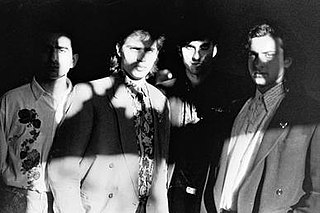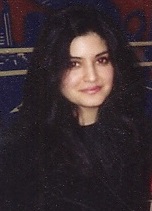Related Research Articles
The Music of Pakistan includes diverse elements ranging from music from various parts of South Asia as well as Central Asian, Middle Eastern, and modern-day Western popular music influences. With these multiple influences, a distinctive Pakistani music has emerged.

Vital Signs were a Pakistani pop and rock band formed in Rawalpindi in 1986 by two Peshawar University students. After their formation, they soon became Pakistan's first and most commercially successful as well as critically acclaimed act. The band's popular lineup consisted of keyboardist Rohail Hyatt, bassist Shahzad Hasan, guitarist Nusrat Hussain and vocalist Junaid Jamshed. Rooted in Rawalpindi with some influence from Western music during the conservative regime of President Zia-ul-Haq, the Vital Signs utilizes several genres, ranging from pop music to rock, and often incorporating classical and other elements in innovative ways. In the early 1990s, they came to be perceived by many Pakistani fans and country's cultural observers as a "promising new era of cultural revival". Their enormous popularity significantly opened a new wave of music and a modern chapter in the history of Pakistan.

Indian pop music, also known as Indi-pop, refers to pop music produced in India that is independent from filmi soundtracks for Indian cinema. Indian pop is closely linked to Bollywood, Tollywood, Kollywood and the Asian Underground scene of the United Kingdom. The variety of South Asian music from different countries are generally known as Desi music.
Shoaib Mansoor, is a Pakistani television and film director, writer, producer, lyricist and musician of Muhajir origin.

Ali Azmat Butt is a Pakistani singer-songwriter, musician and actor. He is best known as the lead singer for the influential Sufi rock band Junoon and for his subsequent solo career later followed by a career as an actor as well.
Nazia and Zoheb were Pakistani pop duo from Karachi, Sindh formed in 1980. The group consisted of two siblings, Nazia Hassan and Zoheb Hassan, who were singing sensations and pop icons across South Asia. They are regarded as pioneers of the Pakistani pop scenes, and were one of the most successful Asian pop duos of all time, selling more than 105 million albums worldwide.

Fifty Fifty is a popular Pakistan Television Corporation sketch comedy series which was aired on the national television PTV from 1978 to 1984, based loosely on the American comedy show Saturday Night Live. The programme was a sketch comedy considered by many critics as one of the best television shows to be produced in Pakistan.

Nazia Hassan was a Pakistani singer-songwriter, lawyer and social activist. Referred to as the Queen of South Asian Pop, she is considered one of the most influential singers in Pakistan and India as well. Starting in the 1980s, as part of the duo Nazia and Zoheb, she and her brother Zoheb Hassan, have sold over 65 million records worldwide.
Pakistani rock is a variety of rock music that is largely produced in Pakistan. Pakistani rock incorporates elements of both British–American rock and Pakistani classical music.
Zoheb Hassan is a Pakistani pop icon, singer, songwriter, producer, and was a part of the superduo Nazia and Zoheb.
Pakistani popular music or shortly Pakistani pop music refers to popular music forms in Pakistan. Pakistani pop is a mixture of traditional Pakistani classical music and western influences of jazz, rock and roll, hip hop and disco sung in various languages of Pakistan, including Urdu. The popularity of music is based on the individual sales of a single, viewership of its music video or the singer's album chart positions. Apart from within Pakistan, Pakistani pop music has also achieved an influential following and popularity in neighboring countries and is listened by members of the Pakistani diaspora, especially in the Middle East, Europe and North America.
Tariq Aziz was a Pakistani television host, poet and film actor, known for PTV's quiz show Neelam Ghar, first aired in 1974, later renamed the Tariq Aziz Show and lately as Bazm-e-Tariq Aziz. He was known for his iconic line " Dekhti Aankhon,Sunte Kaanon Tariq Aziz ka Salam".
Mohammed Ali Shehki is a Persian-Pakistani pop singer. Shehki entered the music scene in the 1970s with his originally composed and written songs, with a touch of Persian music. He later earned a name for himself in Pakistani pop music and as a playback singer.
Ismail Tara, born Muhammad Ismail Merchant, was a Pakistani actor and comedian.
Shahid Mahmood Nadeem is a Pakistani journalist, playwright, screenwriter, theater and television director, and a human rights activist.
Sabir Zafar is a leading poet and lyricist in Pakistan. He has written songs for many Pakistani films, singers such as Nazia Hasan, Sajjad Ali, Ali Azmat and his band Junoon, as well as many successful TV drama serials. He was awarded a Tamgha-e-Imtiaz by the Government of Pakistan in 2010.
Asghar Nadeem Syed is a Pakistani playwright, TV drama serial writer and poet. He has written shows for the Pakistani state channel, PTV, Shalimar Television Network.
Mian Sheheryar was a Pakistani television and film music composer.
Khawaja Najam ul Hasan(Urdu:خواجہ نجم الحسن ; born 4th October 1949) is a prominent television Producer/Director/Trainer and one of the pioneers of television in Pakistan since television was first introduced in the country in 1964.He has been decorated with many awards including best TV producer for Moods and Melodies in Singapore and the Pride of Performance award by the President of Pakistan in 2005.
References
- 1 2 Nadeem F. Paracha (15 March 2014). "Street dancing years: The golden age of Pakistani pop music". Dawn (newspaper). Retrieved 31 January 2020.
- 1 2 Nadeem F. Paracha (13 December 2004). "Socio-political History of Modern Pop Music in Pakistan". Chowk.com website. Archived from the original on 18 June 2010. Retrieved 31 January 2020.
- ↑ "The PTV cadre maintained its character". The News International (newspaper). 23 November 2014. Retrieved 31 January 2020.